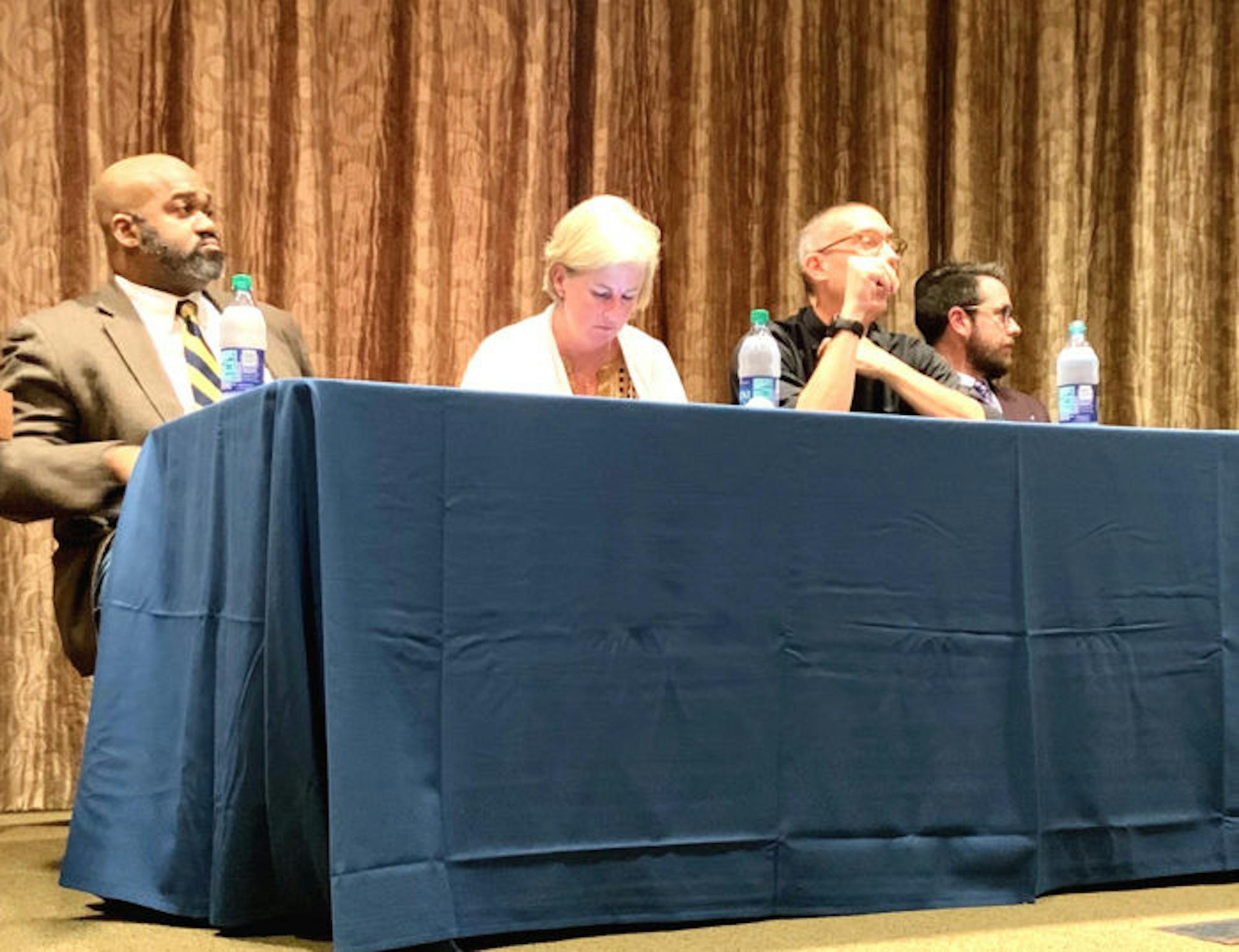Speakers called for further transparency in the Catholic Church and laity-guided reform in a panel titled “Where Did the Church Go Wrong: Crisis and Response” on Tuesday night in Geddes Hall.
The panel was the first in a speaker series from the College of Arts and Letters’ Dean’s Fellows titled “God. Country. Notre Dame.”
The panel featured Richard Jones, director of Notre Dame’s Gallivan Journalism Program; Jennifer Mason McAward, director of the Klau Center for Civil and Human Rights; Fr. Pete McCormick, director of Campus Ministry; and Timothy O’Malley, director for education at the McGrath Center for Church Life.
Jones said transparency is one of the most important keys to addressing the abuse crisis. He began reporting on clergy abuse about 17 years ago after the Boston Globe broke news of the Archdiocese of Boston sexual abuse scandal in 2002. At the time, Jones was working as a correspondent for the New York Times in New Jersey and interviewed a survivor, who described the abuse he suffered in detail.
“My editors and I grappled with how much of that do we include in the story and ultimately decided to err on the side of disclosing those things and describing those things,” Jones said. “... When you mention the phrase ‘abuse,’ it can seem very abstract.”
The abuse is “more than just an isolated incident,” Jones said, as the Pennsylvania Grand Jury Report revealed that about 10% of priests who worked in the state were credibly accused of abuse during a period spanning decades.
While reporting on these stories, journalists should keep survivors at the center, Jones emphasized, and not be afraid to recognize their own emotional reactions to the stories they’re covering.
“There’s no shame in showing emotion when you’re out reporting the story,” he said. “... But as a professional, you have to do your job. You have to get to that story. You have to make sure that you’re able to bear witness for the people who are courageous enough to share their stories with you.”
Mason McAward said her work as a professor at the Notre Dame Law School has helped frame her response to the crisis. She said her teaching pivots on one question: What do you do when someone in authority violates your rights? McAward said she brings this to her work addressing the abuse crisis.
Last year, Mason McAward was asked by the University to co-chair a Campus Engagement Task Force with vice president for mission engagement and Church affairs Fr. Gerry Olinger. The task force held a series of listening sessions to give students a platform to voice their thoughts and concerns about the crisis. McCormick, also a member of the task force, helped facilitate the sessions.
“It was just a really profound experience for me to listen to these struggles and have the privilege of having people share their sorrow, and their anger and their hope,” Mason McAward said.
Mason McAward said she had three main takeaways from the sessions: there is hope for reform in the Catholic Church; change can only happen if high-ranking clergy are held accountable for abuse coverups; and laity cannot wait for the Church in addressing the crisis for only they can bring about reform.
“There has to be public accountability and relinquishing control over some aspects of Church governance,” she said. “And so, how do we get there? I think we need young, hopeful people who love their Church and are willing to take those hard steps to move the Church to where it needs to be.”
McCormick said his position as a priest has made the crisis especially difficult to grapple with. He joined the Moreau Seminary in 2000 and moved to a seminary in Colorado Springs the following year. Around that time, he saw “one article after the next after the next” about the crisis, but believed it was the result of a few “bad actors,” he said.
He said when the Pennsylvania Grand Jury Report was published last year, his worldview was shattered.
“It led me to ponder how it is that I could frankly trust many things,” he said. “So I had to put my energy somewhere. I was really sad for an extended period of time, as I just tried to wrap my head around what was going on. And finally, in prayer, as I was reflecting on this, I realized, ‘Well, you've got to affect the change that you can affect where you’re at.’”
McCormick encouraged community members to overcome a sense of “paralysis” in the face of the crisis, and get to know their priests as a first step towards healing the wounds of the abuse crisis.
O’Malley said three things were important to understanding the current crisis: First, the Church has always been host to corruption, as is the nature of all bureaucratic powerhouses.
Second, the abuse crisis is perpetuated by power dynamics within the Church.
“The connection between sex and power is something that has to be acknowledged,” he said.
Last, while the crisis has sparked calls for lay governance, O’Malley said he cautions against viewing this as a solve-all.
“I don’t deny that checks and balances are good,” he said. “But I’m also aware that laypeople are also capable of lying, and are capable of building structures of power that make things difficult.”
Instead, O’Malley said, the Church should strive to follow Christ’s example of just governance.
“One of the things needed is a deeper theological recognition of this: governance in the Church is modeled not on governance according to power politics,” he said. “… What does it mean to govern in a way that's committed to justice and love and love into the end?”
ND panelists call for transparency, lay activism in Church sexual abuse crisis
Speakers addressed transparency and the sexual abuse crisis in the Catholic Church during a panel discussion on Tuesday.
Speakers addressed transparency and the sexual abuse crisis in the Catholic Church during a panel discussion on Tuesday.









